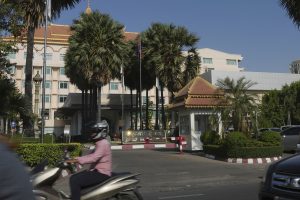The European Union and United Nations abruptly rescheduled the launch of an anti-human trafficking program this week after being confronted with questions on the choice of venue: a Phnom Penh hotel owned by a Cambodian tycoon, who has another property that has been used by human traffickers.
The launch of the EU-U.N. “PROTECT” project, which aims to help prevent violence against women and children, human trafficking, and migrant smuggling, had been set to take place May 3 in Cambodia in the Phnom Penh Hotel. The facility is owned by L.Y.P. Group, a conglomerate entirely run by the family of tycoon Ly Yong Phat, a Cambodian senator with close ties to Prime Minister Hun Manet.
Though Ly Yong Phat himself has not faced any human trafficking charges, a casino run by his business has been raided at least twice, and both times authorities rescued people who had been forced to work there in call center scams and other illicit activities.
After being questioned by The Associated Press about the choice of an L.Y.P. Group hotel for the program launch, local offices of both the EU and U.N. agencies involved replied that they had decided to reschedule the event to a later date. The U.N. added that the event’s location was “under review.”
In Brussels, the European Commission refused to elaborate on the situation and referred all questions back to the EU delegation in Cambodia.
U.N. Resident Coordinator to Cambodia Joseph Scheuer, who had been scheduled to participate in the event, said his understanding was that the Phnom Penh Hotel had been chosen as a venue by the Cambodian government.
“I believe the concerned agencies have investigated this further … and are taking appropriate action,” he said.
The problem of human trafficking in Southeast Asia has been a major area of focus for the U.N., which said in a report last year that some 100,000 people had been trafficked and forced to work in online scam centers in Cambodia, while also estimating that more than 100,000 more were forcibly held in similar situations in Myanmar, Laos, the Philippines, and Thailand.
Cambodian authorities have acknowledged human trafficking and scam centers exist but have rejected the U.N.’s figures. Cambodian authorities have claimed that many cases of alleged human trafficking are actually disputes between employers and employees.
Authorities raided the L.Y.P. Group-owned O’Smach Resort casino on Cambodia’s northern border with Thailand in October 2022 and March 2024, rescuing multiple suspected victims of human trafficking, according to the Interior Ministry.
Such operations often lure people from around the region with the promise of legitimate jobs, then force them to work against their will in centers involved in online and telephone scam operations.
Following the most recent raid on the O’Smach Resort, Thai authorities said 19 of its nationals were among about 50 people rescued who had been forced to work in a Taiwanese-run scam operation, and that those who didn’t meet daily targets were subjected to electrical shocks or other abuse.
Several victims rescued from scam operations in O’Smach recounted being recruited by agencies and taken to what they thought were customer service jobs in Thailand. But they told human rights groups directly involved in their rescue that they were then trafficked across the border to Cambodia, forced to work without pay, not allowed to leave the compound and faced death threats if they sought help.
Taiwanese authorities confirmed that several of its citizens have been rescued from scam operations at the O’Smach Resort, but have not specified when.
Reached by telephone, Ly Yong Phat handed the call off to an assistant, who hung up when asked about the allegations of human trafficking and criminal activity at L.Y.P. Group-owned properties. The L.Y.P. Group, of which Ly Yong Phat is president, did not respond to requests for comment.
The $13 million EU-funded “PROTECT” initiative is being run by the UNODC, UNICEF, UN Women, and the International Labor Organization, working with the Cambodian Ministry of Labor and Vocational Training.
Ministry officials did not respond to requests for comment on the choice of venue for the launch of the project.
Anti-trafficking advocates criticized the original decision to schedule an anti-trafficking event at a property owned by L.Y.P. Group, given the history of its O’Smach Resort.
“The international community must approach engagement in Cambodia with enhanced due diligence to avoid unwittingly legitimizing its most pernicious actors,” said J. Daniel Sims, a transnational crime expert at the United States Institute of Peace.
He added that police would have had to have reached out to the owner of the property in every reported case of human trafficking, so it was hard to believe that Ly Yong Phat was unaware the casino complex had been used by scam centers over multiple years.
“In my view there’s zero case for plausible deniability,” he said.
Regional watchdog group Cyber Scam Monitor said in a written statement that although Cambodia “claims to be serious” about fighting the online scam industry, only low-level workers have been arrested in raids while “the landlords and protectors seem to be untouchable.”

































